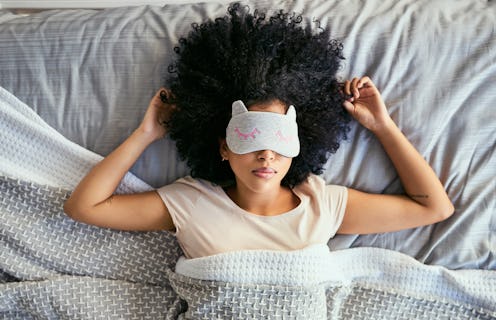
January is the month of resolutions, with Veganuary being one of the most popular choice among non-plant-based eaters. But, outside of Veganuary, interest in veganism and plant-based diets have skyrocketed in recent years, and now it seems that it might not just be your health and the environment benefitting from you diet. In fact, recent research suggests veganism might help you get a better nights sleep.
If you're considering a switch to veganism, a recent study from the American Journal of Lifestyle Medicine might be the deciding factor. The study found that processed meat and animal-based foods can worsen sleeping conditions like obstructive sleep apnoea, a disorder in which your breathing stops and starts during your sleep. But what products should be avoided to help you drift off, and what can be consumed to help you hit the sack?
Speaking to Bustle, Phil Lawlor, a sleep expert at mattress company Dormeo, says:
“Fatty foods are harder to digest, so can keep your body too busy to sleep. That means that fatty cuts of meat and high-fat dairy products, such as butter and cheese, can disrupt your sleep — especially if consumed in excess or the three hours before bedtime.”
However, it's important to note that a vegan diet will not instantly give you a good night's sleep. In fact, a few studies suggest that vitamin B12, which some vegans can end up lacking in their diets, is needed to keep sleep-wake cycles in sync. B12, which is usually digested through animal products, is needed to help speed up reactions in the body, and deficiency can even cause anaemia and nervous system damage. According to Psychology Today, some sleep studies show a correlation between low Vitamin B12 and insomnia. Phil Lawlor says plant-based eaters can simply include breakfast cereals, nutritional yeasts and plant-based milks are often fortified with vitamin B12 to make sure it's in their diet.
And, if you aren’t a vegan and still want a good night's sleep, there are some products you could cut down on before bed. Needless to say, avoiding coffee is a good idea, Lawlor says. “Its effect differs by person, but a study published in the Journal of Clinical Sleep Medicine found that caffeine taken 6 hours before bedtime has important disruptive effects on sleep.” Consuming sugar and alcohol before bed can also disrupt sleep.
Consuming the amino acid Tryptophan can also help you get a good night's sleep, Lawlor says. It can be found in oily fish, poultry and eggs. But for plant-based eaters, there are ways to find it elsewhere in seeds, nuts, soy, and beans, Lawlor explains.
Whether you're a meat eater or vegan, having a good sleep hygiene (practices and habits necessary to achieve a good night's sleep) will help improve your restless nights. "Participating in regular exercise, eating and drinking well, creating a suitable sleep environment, allowing yourself to unwind before bed, and sticking to a sleep routine," Lawlor says. "If you don't wake up feeling refreshed or regularly struggle to fall asleep, this is likely a symptom of poor sleep hygiene. It's a good idea to speak to your doctor if you're concerned about poor-quality sleep."